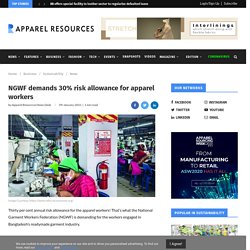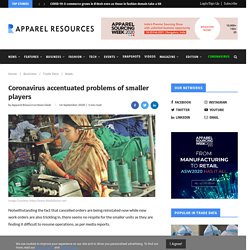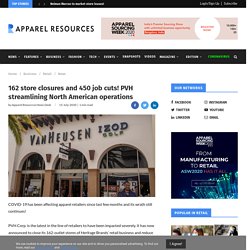

NGWF demands 30% risk allowance for apparel workers. Thirty per cent annual risk allowance for the apparel workers!

That’s what the National Garment Workers Federation (NGWF) is demanding for the workers engaged in Bangladesh’s readymade garment industry. The garment workers’ federation, underlining that the garment workers have been risking their lives to work in the factories even at times other than the coronavirus pandemic, came up with the demand on 8 January (Friday). Most factory workers in the country (Bangladesh) have been working at a risk to their lives, stated NGWF President Amirul Haque Amin while adding that even during the COVID-19 pandemic, workers risked their lives to produce in factories for the sake of livelihood and the industry.
But they are unable to speak openly, maintained Amirul while underlining that on one hand, there is a risk to life and on the other hand there’s uncertainty over employment while prices of daily commodity are also increasing. Consumers to prefer local markets, e-commerce platforms for festive shopping: Survey. As COVID-19 cases have begun to witness a sharp rise after an initial dip, consumers are expected to keep away from visiting shopping malls or large marketplaces for Diwali shopping including apparels and other festive essentials.

According to a recent survey by Local Circles, a community social media platform, about 66 per cent consumers are more likely to opt for local markets for festive shopping. The survey also underlined that only around 20 per cent consumers are expected to visit main markets for festive shopping this time around. So far as those keen to visit shopping malls are concerned, only 16 per cent have shown interest. Quite obviously, this gives new hopes to local brands and retailers to see higher consumer footfalls this season, the survey highlighted. A total of 16,000 people participated in the survey, out of which 61 per cent were from Tier-1 cities, 27 per cent from Tier-2 cities and 12 per cent from Tier-3, Tier-4 and rural districts. COVID-19: E-commerce grows in B’desh even as those in fashion domain take a hit. Thanks to the breakout of coronavirus pandemic, e-commerce in Bangladesh witnessed a massive growth lately.

According to media reports, in the 8 months or so of this year, the size of e-commerce sector in Bangladesh grew to Taka 16,616 crore compared to the market size of Taka 13,184 crore in 2019. The outbreak of the pandemic has reportedly changed consumers’ habit and lifestyle thereby creating new growth opportunities for the online players.
However, this growth has remained restricted to essential commodities, groceries and hygiene products mostly with those catering to fashion taking a hit, claimed reports citing industry insiders. Coronavirus accentuated problems of smaller players. Notwithstanding the fact that cancelled orders are being reinstated now while new work orders are also trickling in, there seems no respite for the smaller units as they are finding it difficult to resume operations, as per media reports.

According to reports, following the countrywide shutdown imposed by the Government to curb the spread of the COVID-19 pandemic, many smaller players owing to capital shortage had to shut down operations permanently. Many others were yet to decide on work resumption as no consensus could be reached between the factory owners and the trade union leaders on the issue as many of these factories were yet to clear the workers’ wages and dues with union leaders demanding dues be cleared first before work resumes. 97.1% women workers in low paid jobs, no improvement in participation of women in managerial roles: ILO study. Westfield shopping centres shut out two retailers over rental disputes. Ever since the mandatory store closures due to lockdowns all over the world, brands have been trying to negotiate high rents with their landlords and while some have been successful, others have seen tensions escalate quickly.

In what comes as a surprise to two Australian retailers, Westfield shopping centres locked the tenants out of their stores over rental disputes. Scentre Group, owner of Westfield properties, recently shut 129 stores operating under women’s fashion chain Mosiac Brands and 38 Strandbags stores. Mosiac was one of the retailers pushing hard for rent reductions as they faced negligible sales and footfall in stores. Richard Facioni expressed his disappointment saying that a relationship that spans over 40 years was met with this fate, that too in such a volatile environment for retail. The store closures impact over 400 jobs, but the brand is trying its best to employ the workers in the stores that are open in other locations. Fraudulently claimed IGST refund! 1,474 risky exporters identified. There are 1,474 risky exporters, identified by the finance ministry, who have fraudulently claimed IGST refund worth Rs. 2,020 crore.

As per media reports, these claims grabbed everyone’s attention owing to a programme for exporters’ risk management. Surprisingly, out of these 1,474 untraceable exporters, 1,125 (that’s more than 76 per cent) are from Delhi. Apart from many other product categories, these exporters are engaged in the export of apparels, leather garments and floor coverings. As per Government officials, the fraudulent claims caught everyone’s attention during a verification exercise, which found the exporters untraceable, following which their refund claims have been blocked. They also said that strong action will be taken against these exporters. If an adverse report is generated post verification of the exporter or his suppliers, IGST refund will be suspended in all such cases. As per the official, two-stage verification requires only three or four documents.
162 store closures and 450 job cuts! PVH streamlining North American operations. COVID-19 has been affecting apparel retailers since last few months and its wrath still continues!

PVH Corp. is the latest in the line of retailers to have been impacted severely. It has now announced to close its 162-outlet stores of Heritage Brands’ retail business and reduce its office workforce by approximately 450 positions or 12 per cent. The Heritage Brands’ retail stores are expected to operate through mid-2021. Retailers witness 67% decline in sales during 15-30 June. In a recent business survey conducted by the retail trade association of the country, Retailers Association of India (RAI), it was found that retailers saw a huge 67 per cent decline in business during 15-30 June compared to the corresponding period of last year.

The survey was conducted on over 100 big and small retailers, and RAI concluded in the results that there has been no significant growth in business for retailers even during the second half of June. “During the same time frame, malls witnessed 77 per cent degrowth (year-on-year) on account of not being allowed to open uniformly across the country, and high street retail showed degrowth of 62 per cent in business despite being allowed to open across India,” RAI shared. The survey report further stated that in the month of June, large size retailers (sales of over Rs. 300 crore) faced a decline of 59 per cent, whereas small retailers (sales less than Rs. 300 crore) noticed a fall of 69 per cent. Tannery owners seek Taka 600 crore from Govt. to deal with capital crunch. The coronavirus pandemic has adversely impacted not only the readymade garment industry of Bangladesh but also the leather sector – considered the second most promising after RMG in terms of export potential – which is dealing with severe capital crisis.

As per the Bangladesh Tanners Association (BTA), the sector has witnessed a significant drop in sale of leather and leather products, which has impeded the raw hide business and resulted in acute financial crisis. Work orders for finished and crafted leather from South Korea, Spain, Hong Kong and Italy, which are amongst the major markets for leather products made in Bangladesh, have reportedly dropped 40 per cent.
The President of BTA Md Shaheen Ahmed maintained subsequent to low demand amongst the buyers, stock of leather have now piled up in the processing units, leaving little capital with tannery owners to purchase raw hide this year. COVID-19 effect! Apparel imports of EU see serious dent in Jan.-Mar. ’20. The European Union (EU) dwindled both volume-wise and value-wise in its apparel imports during Jan.

-Mar. 2020 period. The imports fell in the aftermath of the COVID-19 in Europe. EU imported € 19.58 billion worth of garments in the first quarter of 2020, falling by 11.46 per cent on the yearly note. While the volumes – worth 1,046 million kg – plunged by 12.69 per cent, the unit values (per kg of the garments) escalated by 1.41 per cent to € 18.72.
The Chinese shipment to EU tumbled 18.69 per cent in Q1 ’20 and clocked € 5.16 billion revenue. Unit values of the Chinese shipment surged by 2.69 per cent and stood at € 18.27 in Jan. ‘Limited operations’ by Flipkart during lockdown impacted Walmart’s international business for Q1. US-based retail major Walmart said that limited operations of Flipkart in India for the duration of the first quarter (February-April) while the country was in lockdown due to COVID-19 outbreak, have adversely impacted the growth in its international business. The Government in India had restricted the online firms to delivering only essential merchandise during the lockdown that began 25 March. Cotton farmers in Maharashtra suffering! Every stakeholder of textile industry is today worried about its business and situation is no different for the cotton farmers too at grassroot level.
Especially in Maharashtra, the condition of cotton farmers is not good; at least that’s what some of the media reports are claiming. A recent report of The Print says that farmers in Maharashtra’s cotton zone, Vidarbha, have been struggling owing to lockdown, with many resorting to distress sale as unseasonal rains are affecting the quality of produce. Around 25 per cent of state’s cotton produce worth Rs. 5,500 crore is still unsold as the lockdown and unseasonal rains have hit the procurement season that typically ends by April. As far as condition of cotton farmers in other states is concerned, details are still not available. Team Apparel Resources had approached officials in this regard, but they had nothing to share.
Some factories resume work, some do not! Know what’s happening across India. Garment factories across India wish to resume work. What’s the latest across the country! While apparel manufacturing hubs like Bengaluru have started work, many others like Tirupur, Delhi-NCR and Jaipur are in process to start work. In Maharashtra, most of the factories are in red zone and so remain non-operational. Saks Fifth Avenue preparing to file for bankruptcy. Adidas registers 97% fall in net profit in Q1. German shoemaker adidas has reported its net profit for the first quarter of 2020 fall by 97 per cent due to the ongoing global pandemic. The net profit for the year was reported to be US $ 21.5 million compared to US $ 681.3 million a year ago, with more than 70 per cent of its offline stores currently shut. The brand has, however, seen a 55 per cent increase in online sales in March and a 35 per cent rise for the first quarter overall, even as the rise in online sales failed to prevent the brand’s revenue fall by 19 per cent to €4.75 billion.
Kasper Rorsted, CEO, adidas, said “Our results for the first quarter speak to the serious challenges that the global outbreak of the coronavirus poses even for healthy companies. New coverall regulations unfurled to restrict traders. Ministry of Textiles, India has recently unfurled new set of regulations to enhance standards of body coverall suits. The officials have also announced the body coverall manufacturers need to submit declaration that there are no commercial benefits for them as well as the procured fabrics meet the specifications. Markedly, testing norms have not changed, only the certification process has. The new norms for body coveralls and for fabric state that the domestic coverall/fabric manufacturers applying for approval certifications will now have to attach a notarised affidavit which will declare they are not traders.
Macy’s to raise US $ 5 billion in debt to avoid bankruptcy. Amazon’s top seller Cloudtail delays payments to suppliers. Amazon employees to go on strike against unsafe working conditions. Global brands demand discounts up to 50 per cent. E-commerce players set to start operations in full swing starting 20 April. After the Ministry of Home Affairs (MHA) released a set of revised guidelines for services that are allowed during the extended lockdown, several e-commerce companies including Flipkart, Snapdeal and Paytm are all set to resume operations from 20 April.
JCPenney explores options to manage debt amidst Coronavirus lockdown. Macy’s hires Lazard for options to shore up finances during COVID-19 lockdown. Amidst the COVID-19 pandemic, Macy’s has hired investment bank Lazard Ltd. to explore options for strengthening its finances after the retail firm incurred heavy losses post shutting down all its stores, confirmed people familiar with the matter. Vietnam’s major apparel products to USA show diverse export trend. Package for apparel industry expected to be announced in 2 to 3 days. Looking desperately towards Government for support, the Indian apparel industry will get a package this week. Brunello Cucinelli withdraws 2020 forecast due to COVID-19. Face masks are the new entrants in apparel categories. Fast Retailing slashes its annual outlook by 41 per cent. Macy’s CFO resigns amidst COVID-19 turmoil. H&M secures €980 million to strengthen liquidity amidst COVID-19.
Myntra partners with Wildcraft; will sell protective face masks on its platform. PVH also announces salary cut! Focus on cutting costs. Family of Walmart employee who died of COVID-19 files wrongful death lawsuit against the firm. Neiman Marcus proceeds with bankruptcy protection amidst COVID-19 pandemic. Inditex’s major logistics and clothing units put on hold! Retail industry writes to Government of India for relief measures. COVID-19: Gerber Technology partners with Hardwire to produce face shields.
Wolverine World Wide Inc. reports 1.5% increase in revenue for FY19. Apparel workers in Cambodia left in lurch as Coronavirus crisis intensifies. LPP cuts down management pay to almost zero amidst Coronavirus crisis. Another footwear trade show gets postponed! Milan Men’s and Women’s Fashion Week to be combined! China normalises operations after COVID-19 spread. Coronavirus – a major setback in US $ 2.5 trillion trade show industry. Chinese envoy advices Bangladesh apparel manufacturers against dropping China for raw materials. Amidst Coronavirus outbreak in China, Gurugram garment manufacturers expect growth.
Ralph Lauren fears US $ 70 million losses in Q4 owing to Coronavirus. VINATEX to provide 6 million anti-bacterial face masks by February end.